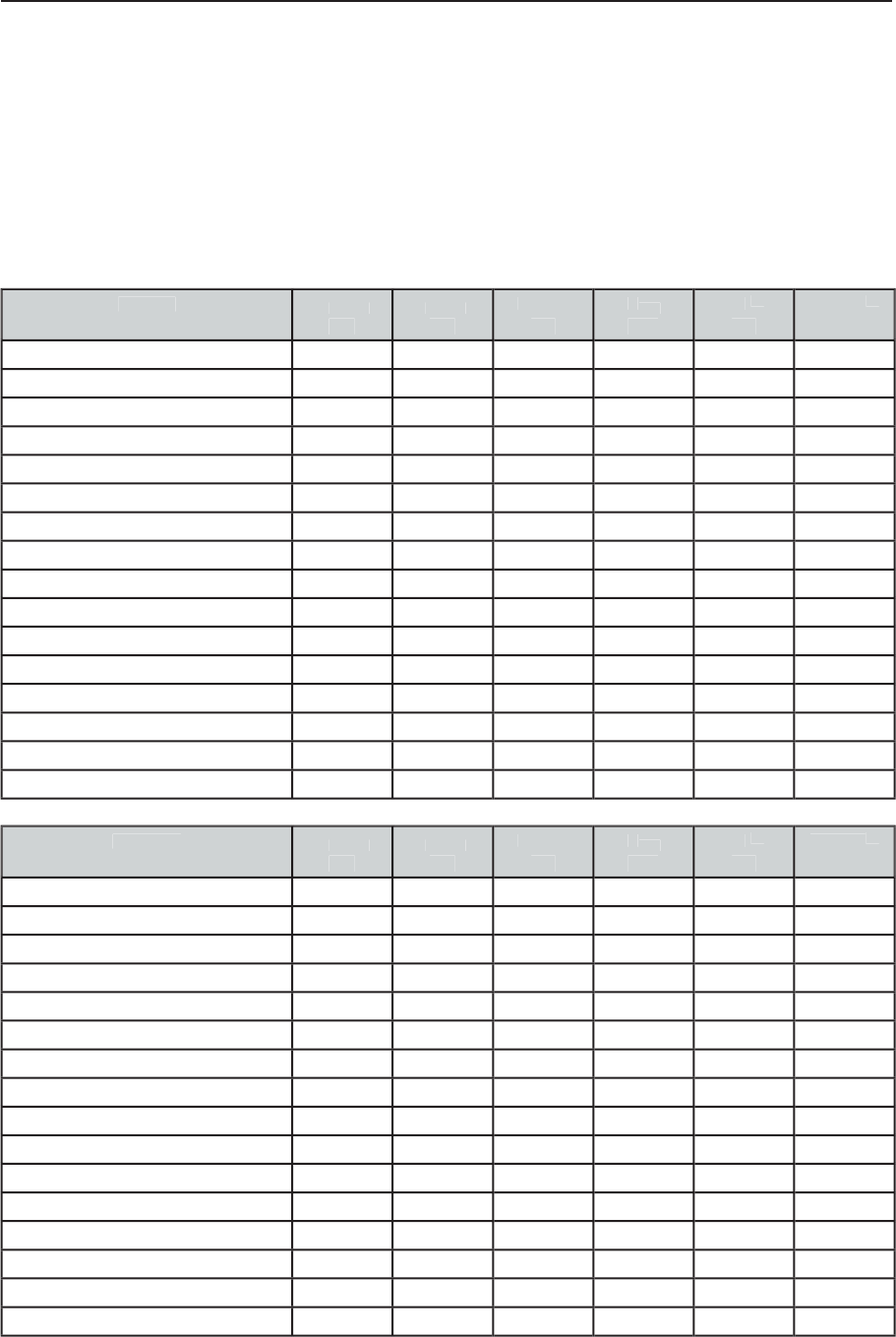
MAINS OPERATION & RESULTING TEMPERATURE
MAINS OPERATION & RESULTING TEMPERATURE
The following tables allow determining power supply and cabling requirements.
The power drawn from the mains network is converted into output power to feed the connected
loudspeaker systems and into heat. The difference between power consumption and dispensed power
is called power dissipation (Pd). The amount of heat resulting from power dissipation might remain
inside of a rack-shelf and needs to be diverted using appropriate measures. The following table is
meant as auxiliary means for calculating temperatures inside of a rack-shelf system/cabinet and the
ventilation efforts necessary.
The column „Pd“ lists the leakage power in relation to different operational states. The column „BTU/hr“
lists the dispensed heat amount per hour.
9
CL800
U
mains
[V]
I
mains
[A]
P
mains
[W]
P
out
[W]
Pd
(6)
[W]
BTU/hr
(4)
idle
230V
0,42
50
-
50
170
Max. Output Power @ 8Ω
(1)
230V
4,4
735
2 x 240
255
870
Max. Output Power @ 4Ω
(1)
230V
7,2
1295
2 x 400
495
1690
1/3 Max. Output Power @ 4Ω
(1)
230V
4,6
770
2 x 133
504
1720
1/8 Max. Output Power @ 4Ω
(1)
230V
3,1
490
2 x 50
390
1330
1/8 Max. Output Power @ 4Ω
(2)
230V
2,7
425
2 x 50
325
1110
1/8 Max. Output Power @ 4Ω
(2),(5)
254V
3,0
600
2 x 63
474
1615
1/8 Max. Output Power @ 4Ω
(3)
230V
2,8
430
2 x 50
330
1125
1/8 Max. Output Power @ 4Ω
(3),(5)
254V
3,1
530
2 x 63
404
1380
Normal Mode (-10dB) @ 4Ω
(1)
230V
2,8
440
2 x 40
360
1230
Rated Output Power (0dB) @ 4Ω
(1)
230V
6,4
1130
2 x 300
530
1810
Alert (Alarm) Mode (-3dB) @ 4Ω
(1)
230V
4,9
820
2 x150
520
1775
Max. Output Power @ 2Ω
(1)
230V
11,2
2150
2 x 600
950
3240
1/8 Max. Output Power @ 2Ω
(1)
230V
4,8
800
2 x 75
650
2220
1/8 Max. Output Power @ 2Ω
(2)
230V
4,2
680
2 x 75
530
1810
1/8 Max. Output Power @ 2Ω
(3)
230V
4,2
685
2 x 75
535
1825
CL1200
U
mains
[V]
I
mains
[A]
P
mains
[W]
P
out
[W]
Pd
(6)
[W]
BTU/hr
(4)
idle
230V
0,45
54
-
54
185
Max. Output Power @ 8Ω
(1)
230V
6,3
1070
2 x 350
370
1260
Max. Output Power @ 4Ω
(1)
230V
10,4
1920
2 x 600
720
2455
1/3 Max. Output Power @ 4Ω
(1)
230V
6,2
1065
2 x 200
665
2270
1/8 Max. Output Power @ 4Ω
(1)
230V
2,6
400
2 x 75
250
855
1/8 Max. Output Power @ 4Ω
(2)
230V
2,9
455
2 x 75
305
1040
1/8 Max. Output Power @ 4Ω
1/8 Max. Output Power @ 4Ω
(2),(5)
254V
3,1
500
2 x 93
314
1070
1/8 Max. Output Power @ 4Ω
(3)
230V
2,9
450
2 x 75
300
1025
1/8 Max. Output Power @ 4Ω
(3),(5)
254V
3,2
550
2 x 93
364
1240
Normal Mode (-10dB) @ 4Ω
(1)
230V
2,4
365
2 x 60
245
835
Rated Output Power (0dB) @ 4Ω
(1)
230V
9,6
1750
2 x 500
750
2560
Alert (Alarm) Mode (-3dB) @ 4Ω
(1)
230V
7,0
1220
2 x 250
720
2455
Max. Output Power @ 2Ω
(1)
230V
16,1
3180
2 x 900
1380
4710
1/8 Max. Output Power @ 2Ω
(1)
230V
3,8
645
2 x 113
419
1430
1/8 Max. Output Power @ 2Ω
(2)
230V
4,1
680
2 x 113
454
1550
1/8 Max. Output Power @ 2Ω
(3)
230V
4,4
720
2 x 113
494
1685
(1) Sine Modulation (1kHz)
(2) VDE-Noise
(3) pink-Noise EN60065 / 7. Edition
(4) 1BTU = 1055.06J = 1055.06Ws (5) 10% Mains Over Voltage (6) Pd = Leakage Power
The following factors allow direct proportional calculation of the mains current Imain for different mains supply voltages:
100V = 2.3; 120V = 1.9; 220V = 1.05; 240V = 0.96


















